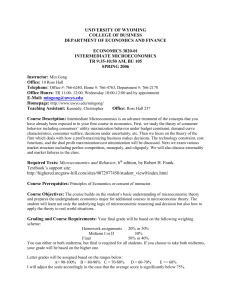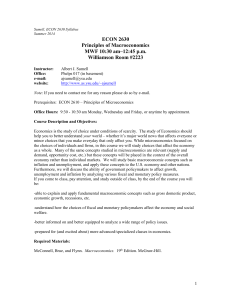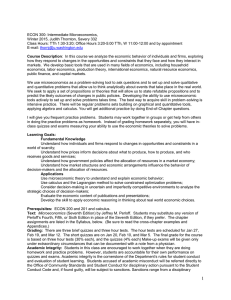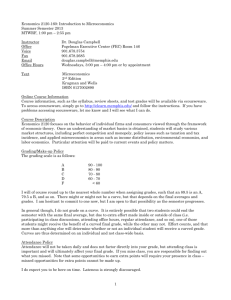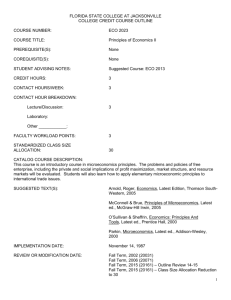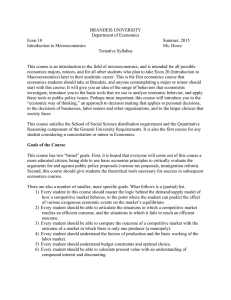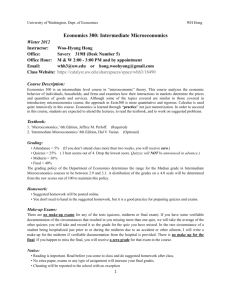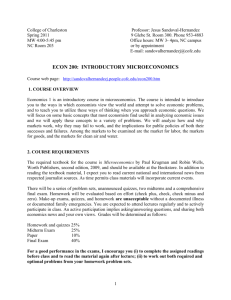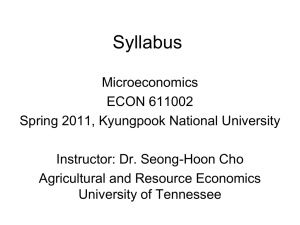Economics 221- Principles of Microeconomics
advertisement
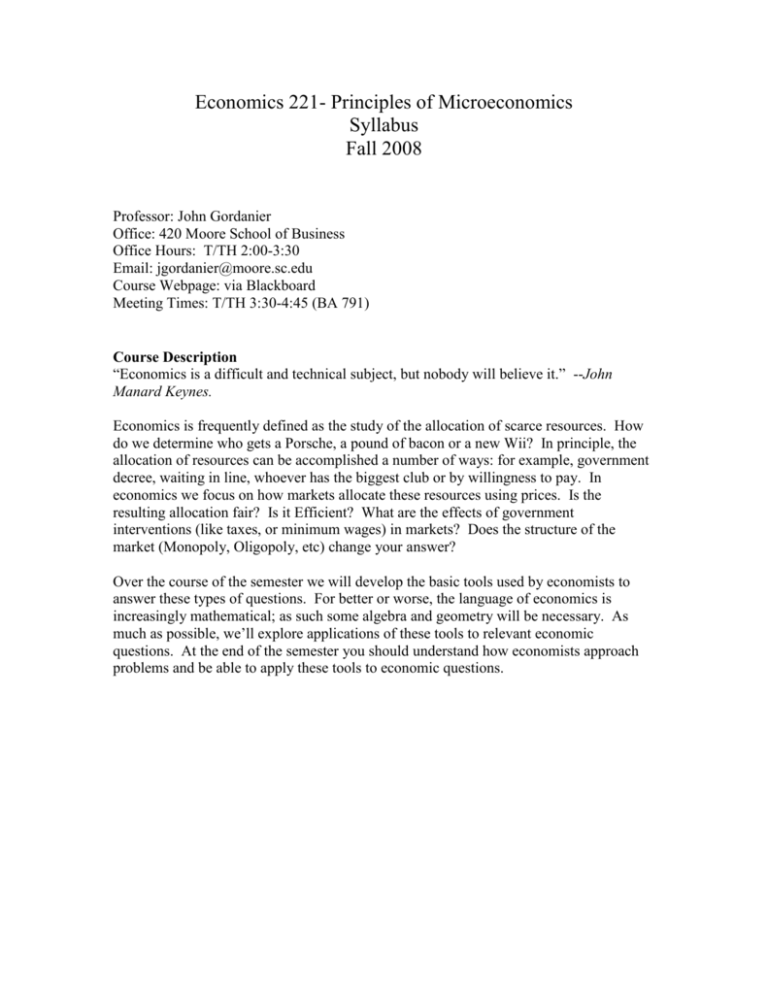
Economics 221- Principles of Microeconomics Syllabus Fall 2008 Professor: John Gordanier Office: 420 Moore School of Business Office Hours: T/TH 2:00-3:30 Email: jgordanier@moore.sc.edu Course Webpage: via Blackboard Meeting Times: T/TH 3:30-4:45 (BA 791) Course Description “Economics is a difficult and technical subject, but nobody will believe it.” --John Manard Keynes. Economics is frequently defined as the study of the allocation of scarce resources. How do we determine who gets a Porsche, a pound of bacon or a new Wii? In principle, the allocation of resources can be accomplished a number of ways: for example, government decree, waiting in line, whoever has the biggest club or by willingness to pay. In economics we focus on how markets allocate these resources using prices. Is the resulting allocation fair? Is it Efficient? What are the effects of government interventions (like taxes, or minimum wages) in markets? Does the structure of the market (Monopoly, Oligopoly, etc) change your answer? Over the course of the semester we will develop the basic tools used by economists to answer these types of questions. For better or worse, the language of economics is increasingly mathematical; as such some algebra and geometry will be necessary. As much as possible, we’ll explore applications of these tools to relevant economic questions. At the end of the semester you should understand how economists approach problems and be able to apply these tools to economic questions. Course Requirements Readings There is one optional text for the class: Microeconomics, 2nd edition by Hubbard and O’Brien. You are more than welcome to use an older version of the textbook, but the chapters I will refer to will come from this edition. In general, there will be no material on exams that is not covered in class. The textbook is only a resource that can be used for additional support. There are many, many microeconomics textbooks that all cover the same set of topics. Any of these texts can serve this purpose. Homework Each week I will post on blackboard a homework assignment and the answer key. The assignment will not be collected or graded. Quizzes Each Thursday we will begin with a short 10-15 minute quiz (so don’t be late) over the previous week’s homework. Quizzes will usually be a slight variant of a homework problem Exams In addition to these assignments there will be three (in class) midterms and a comprehensive final during finals week. There will not be make-up exams for the midterms, even for excused absences. If you miss a midterm, for whatever reason, that portion of your grade will be assigned to the final exam. If you miss more than one midterm you will get a zero on that midterm. You must take the final exam. Attendance There is no attendance component to your grade. Grading Your final raw score will be determined by the following weights: Quizzes 15% Each Midterm 20% Final 25% The final raw score is then used to determine letter grades. Classroom Etiquette Please silence all cell phones, pagers, and other electronic devices when you come into class. You may not use laptops. Please keep your private conversations to a minimum. If you need to leave class early, try to sit at the end of a row. Academic Dishonesty Working in groups on assignments is encouraged, but all the work submitted must be your own. All students are expected to follow the University Honor Code (see below): University of South Carolina Honor Code: “It is the responsibility of every student at the University of South Carolina Columbia to adhere steadfastly to truthfulness and to avoid dishonesty, fraud, or deceit of any type in connection with any academic program. Any student who violates this Honor Code or who knowingly assists another to violate this Honor Code shall be subject to discipline. All forms of academic dishonesty are prohibited. These include cheating, plagiarism, lying in academic matters, fraud, bribery, unauthorized access to tests and examinations.” Rough Schedule Week #1 8/21 Chapter 1 + Introductions Week #2 8/26-8/28 Chapter 2 Topics: Opportunity Cost, PPF’s, Comp Advantage and gains from trade Week #3 9/2-9/4 Chapter 3 and 4 Topics: Supply and Demand and Equilibrium Week #4 9/9-9/11 Chapter 4 Topics: Consumer and Producer Surplus, Price Floors and Price Ceilings Week #5 9/16-9/18 Review and Exam #1 Week #6 9/23-/25 Chapter 4 & 6 Topics: Elasticity and Taxes Week #7 9/30-10/2 Chapter 8 Topics: International Trade Week #8 10/7 Chapter 7 (Especially the appendix) Topics: PDV and Corporate structure Week #9 10/14-10/16 Chapter 10 Topics: Production and Costs, Economies of Scale, Long-Run Cost Curves Week #10 10/21-10/23 Review and Exam #2 Week #11 10/28-10/30 Chapter 11 Topics: Firm behavior in Perfect Competition Week #12 11/6 Chapter 14 Topics Monopoly Week #13 11/11-11/13 Chapter 14 Topics: Monopoly & Cartels Week #14 11/18-11/20 Chapter 13 Topics: Oligopoly and Game Theory Week #15 11/25 Exam # 3 Week #16 12/2-12/4 Chapter 15 Topics: Pricing
